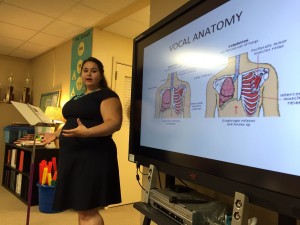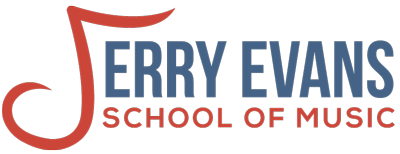 Recently our own voice teacher, Allison Rozsa Evans, was invited to Louisiana to speak with the choir and musical theater kids at our Lady of Mercy school about vocal health. JESM caught up with her upon her return to ask about her trip, questions about vocal health, and why it’s important.
Recently our own voice teacher, Allison Rozsa Evans, was invited to Louisiana to speak with the choir and musical theater kids at our Lady of Mercy school about vocal health. JESM caught up with her upon her return to ask about her trip, questions about vocal health, and why it’s important.
Q. Hi Ms. Evans, would you please introduce yourself and tell us a little bit about you?
A. Happily! I am a graduate of the Boston Conservatory with a Bachelor of Music in Voice Performance, and a Master of Music in Vocal Pedagogy. I have been teaching voice lessons for nearly 8 years, and have recently been appointed to the board of directors for the Chicago Chapter of the National Association of Teachers of Singing. I was a choral director for a while back in Boston, and in the last few years I’ve also been teaching classes on vocal health to school choir students.
Q. Would you give us a short synopsis of your recent trip?
A. On the invitation of my colleague, Eleanor Bach, I traveled to Louisiana to teach classes to all of her middle school choirs at Our Lady of Mercy about vocal health, and what it means to maintain a healthy instrument.
Q. When I think of “health” I think of exercise and diet. Are those things important for vocal health?
A. Absolutely! What one eats and how they are physically active directly affects the voice, as the voice is part of the body and not an external instrument. If someone is always sedentary, eats sugar all day and smokes, certainly that person would not be in top physical condition. This would cause stamina, breathing problems and potential issues with acid reflux from bad nutrition.
Q. What are some basic points you taught during the Vocal Health class?
A. Because the class is an overall synopsis of how to take care of one’s voice, I cover a lot of ground. First, we discussed vocal anatomy, what parts of the body actively work to create sound, after which I then show pictures of the vocal folds (or commonly known as the vocal cords) and a short video of the vocal folds in action. Then, after giving a few examples of unhealthy vocal folds, I give students general knowledge on how to maintain good vocal health. This includes eating, physical activity, vocal exercise through warm-ups, and seeking the guidance of a voice professional.
Q. What’s your favorite part of the Vocal Health class?
A. HA HA! My favorite part is when I show a short video of four people singing, but it is a video of their vocal folds through laryngoscopy (where a small video camera is inserted through the mouth or nose to get view of the vocal folds). Watching the students react is amazing! Some are completely grossed out (imagine a weird video of the inner ear) while others are completely fascinated! I remember the first time I went to the voice doctor and saw video of my own focal folds. I thought it was totally cool!
Q. That does sound really cool! I have so many questions now, but for the sake of not making this too long, here are some questions for our readers who may know nothing about vocal health: What am I doing wrong if singing hurts my throat?
A. Well, since I can’t determine exactly what is going wrong without hearing someone sing, I can say that it is likely do to bad vocal technique and not properly using the breath to drive the sound. If singing causes paid, it is best to meet with a voice teacher and they can help you.
Q. If I can only remember three things about vocal health, what should they be?
A. 1) If you have no breath, you have no sound. It is physically impossible to hold your breath and sing, so breath use is number one priority.
2) There is no magical food or drink to fix or improve the voice. Get to know your own body and what foods/drinks that help give you natural energy or things that make it harder for you to sing. (Sadly, my biggest weakness is coffee, and I LOVE coffee).
3) If your voice hurts, DON’T SING! Singing through pain only makes the problem worse and lengthens recovery time if you are ill (just like you wouldn’t run on a sprained ankle).
Q. OK, last question. What is one thing you love about teaching?
A. I love when a student has an “Aha!” moment. When something they are working on suddenly makes sense and their voice just blossoms! That is definitely one of my favorites!
Do you have more questions about voice health? Are you or is someone you know interested in starting voice lessons? Allison would love to talk with you! Check out her bio! You can also email her at AllisonEvans@JESchoolofMusic.com
















